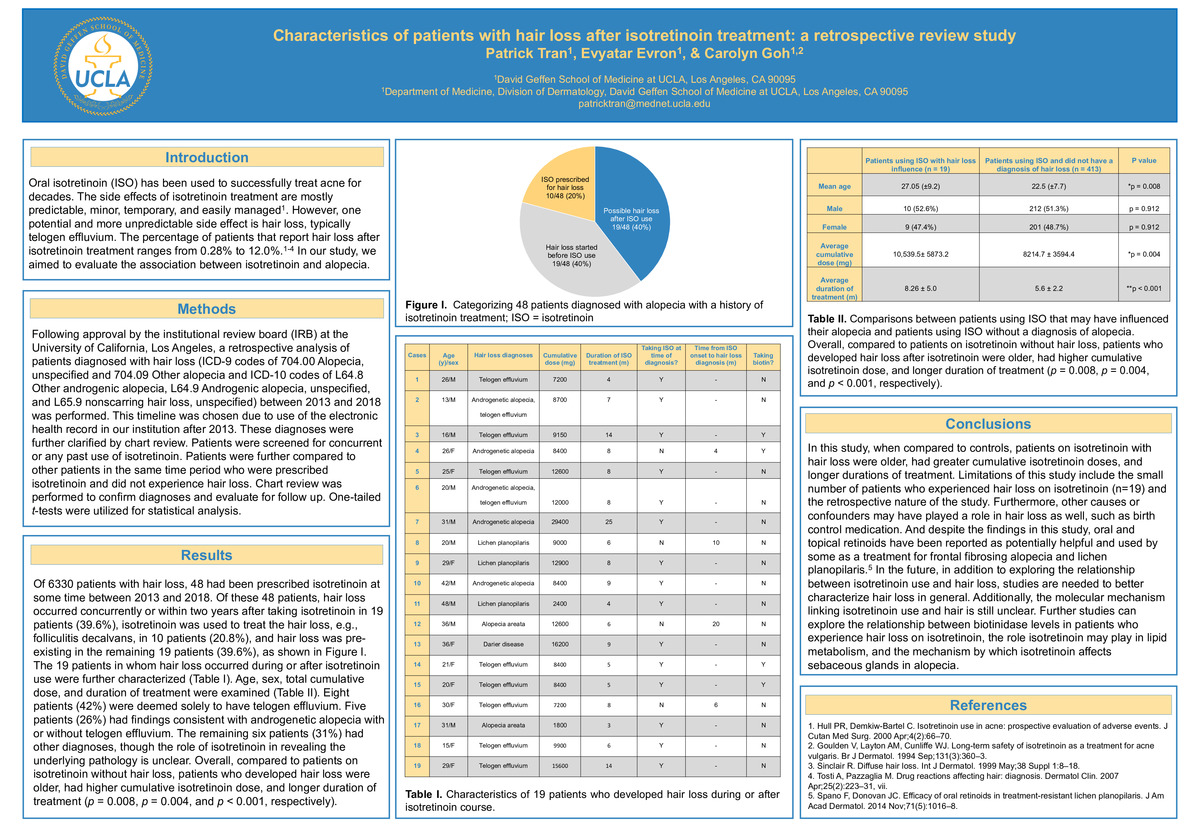-
Author
Patrick Tran -
Co-author
Evyatar Evron, Carolyn Goh
-
Title
Characteristics of patients with hair loss after isotretinoin treatment: a retrospective review study
-
Abstract
Importance: Oral isotretinoin has been used to successfully treat acne for decades. The side effects of isotretinoin treatment are mostly predictable and easily managed. However, one potential and more unpredictable side effect is hair loss, typically telogen effluvium.
Purpose: To further evaluate the association between isotretinoin use and alopecia.
Design: Following approval by the institutional review board (IRB) at the University of California, Los Angeles, a retrospective analysis of patients diagnosed with hair loss between 2013 and 2018 was performed. This timeline was chosen due to use of the electronic health record in our institution after 2013. These diagnoses were further clarified by chart review. Patients were screened for concurrent or any past use of isotretinoin. Patients were further compared to other patients in the same time period who were prescribed isotretinoin and did not experience hair loss. Chart review was performed to confirm diagnoses and evaluate for follow up. One-tailed t-tests were utilized for statistical analysis.
Summary of results: Of 6330 patients with hair loss, 48 had been prescribed isotretinoin at some time between 2013 and 2018. Of these 48 patients, hair loss occurred concurrently or within two years after taking isotretinoin in 19 patients, isotretinoin was used to treat the hair loss, e.g., folliculitis decalvans, in 10 patients, and hair loss was pre-existing in the remaining 19 patients. The 19 patients in whom hair loss occurred during or after isotretinoin use were further characterized. Age, sex, total cumulative dose, and duration of treatment were examined. Eight patients were deemed solely to have telogen effluvium. Five patients had findings consistent with androgenetic alopecia with or without telogen effluvium. The remaining six patients had other diagnoses. Overall, compared to patients on isotretinoin without hair loss, patients who developed hair loss were older, had higher cumulative isotretinoin dose, and longer duration of treatment (p = 0.008, p = 0.004, and p < 0.001, respectively).
Conclusions and relevance: In this study, when compared to controls, patients on isotretinoin with hair loss were older, had greater cumulative isotretinoin doses, and longer durations of treatment. Limitations of this study include the small number of patients who experienced hair loss on isotretinoin (n=19) and the retrospective nature of the study. Furthermore, other causes or confounders may have played a role in hair loss as well, such as birth control medication. And despite the findings in this study, oral and topical retinoids have been reported as potentially helpful and used by some as a treatment for frontal fibrosing alopecia. In the future, in addition to exploring the relationship between isotretinoin use and hair loss, studies are needed to better characterize hair loss in general. Additionally, the molecular mechanism linking isotretinoin use and hair is still unclear. Further studies can explore the relationship between biotinidase levels in patients who experience hair loss on isotretinoin, the role isotretinoin may play in lipid metabolism, and the mechanism by which isotretinoin affects sebaceous glands in alopecia.
-
College
AMC
-
Zoom
-
PDF

